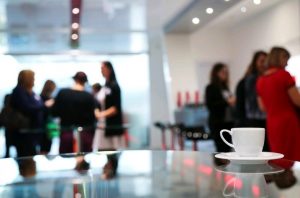Each month inside Pathfinder International magazine, Giles O’ Halloran, an experienced recruitment, talent and HR consultant writes his career column and offers the latest top advice. With over a decade of service in the Reserves, Giles is on hand once more below this time providing advice on a way of thinking which could in theory, make your own luck….

“Last month we looked at the DOTS framework to help plan your career. It is one of a number of models out there and this month we are going to look at something called Happenstance. It is a framework that can help those going through unexpected change and very much fits with the ethos of “adapt and overcome.”
So, in this article, we will explore the theory and its application as a framework to help guide your career and personal development going forward. It is not for everyone, but some of the thoughts and ideas can help you improve your chances going forward.
What is Happenstance?
Happenstance is more a way of thinking and a mindset than a disciplined approach. It was created by Stamford Professor John Krumboltz (2008) who more or less said that we can make our own opportunities in life via planned happenstance, rather than simply thinking about luck. This is about putting pieces in play on the board, being adaptive and taking calculated risks to help you make your own luck.
However, it does rely on a flexible mindset and a certain approach or way of thinking. Some people who like structure and defined processes may find this particular way of working and thinking problematic. Do not worry as DOTS mentioned previously fits better with people who have that mindset. Happenstance is for those who might prefer a flexible and evolving approach.
We will now explore the key themes and things to consider.
Maintain an exploratory attitude:
Things happen to us in life that are unexpected. We often focus on the negatives when they could be a positive or result in positive outcomes. It is how we deal with them and explore them as opportunities that matters.
A great example of this is a redundancy situation. Naturally, they can be seen as a very negative situation, but sometimes they open up options we have never considered. It might mean a career change, setting up on your own or even having the opportunity to take some time out and reflect on next steps. It is very much a state of mind, but we should be curious and take the chance to explore different options as a positive next step forward.
Indecision is an inevitability:
We often see those who do not make decisions as weak, indecisive or as procrastinators paralysed by their inability to get things done. However, if the context and environment you are operating is changing quickly and beyond your control, taking a step back and looking for the right moment to act is the better option.
This is interpreted as open mindedness rather than simply indecision. It is the ability to be adaptable to the situation and steer a course by taking a step back or going with the flow and not making the first move. See what happens as things unfold and adapt to the situation. Sometimes little steps and adjustments are more effective.
A good example of this is regarding a job offer. You may have one or more and it is about taking the time to consider the options to ensure it is right for you. Employers or recruitment consultants that are very pushy might make you decide on something that will not be what you truly want or where you really want to work. Waiting for the next offer and others to come in might allow you to assess which is truly best option for you as a next step.
Plans rarely go to plan:
This was something I was taught many years ago and I know the military have this mindset. We may have the best prepared plan and have everything scheduled, but it rarely goes that way. This is why we use frameworks, allow for flexibility within a plan or run live risk logs on projects so that we can adjust plans to the changing environment.
An example to consider relates to the concept of time. If we apply for a job or we put in a proposal for a piece of work as a freelancer, we have certain expectations regarding when we might hear back or receive feedback. Often, any response takes much longer and is very much outside of our control. We need to take a step back and avoid being stressed by that. Invest that time and energy into other opportunities that might bring a quicker result or even one of many.
Explore new ways of thinking, working and doing:
Many still use the classic way of looking for work. Contact an agency, email a CV, and then load it via a jobsite or respond to online and paper based adverts. However, there are new ways of doing this, other ways of achieving the same outcome, but also new ways to continue to develop our careers.
For instance, many of us can now use Linkedin to do all of the above. We can upload our CV or craft our profile to be our global CV. We can edit the job section so that we are made aware of opportunities and can ensure our profile reflects we are open to work. We can even apply directly via jobs listed by simply attaching our profile as an interested party. These are just a few simple ways and purely Linkedin related. How about doing MOOCs, joining hashtag chat communities to learn and share, downloading developmental podcasts or taking cost effective, flexible micro-credential courses via online providers? These are all new and exciting things to explore that future proof our employability prospects.
Key ways of thinking to create a happenstance approach:
These are the approaches or considerations we need to put in place to be effective in the world of happenstance:
- Curiosity = we need to stay curious. We need to explore different ideas, opportunities and look at new ways of doing this. It is about looking at new ways to do things and continually learning that will sustain our employability.
- Persistence = we have to keep focused in terms of our energy and not lose faith. This is very hard to do, but it means not letting a lack of feedback get to you and putting that energy into other things.
- Flexibility = take an adaptive approach to any planning and be flexible in your mindset. Things change as you progress, so keep that in mind and sometimes simply go with the flow.
- Optimism = you have to have a positive future focused mindset. This is harder than it looks if circumstances are difficult, but there is always a way forward and you have to think positively otherwise you will lose momentum.
- Risk taking = you sometimes need to take a step forward and a calculated risk. You may take time to consider options but there will be a point where you need to take a risk. Sometimes the best things happen as a result.
So, I hope this has given you a brief insight into Happenstance as a mindset. It works for some people but not for all. However, there are some useful points to consider and mindsets that may help you with how you approach and manage your career going forward.”
Read the latest issue of Pathfinder HERE for free!


